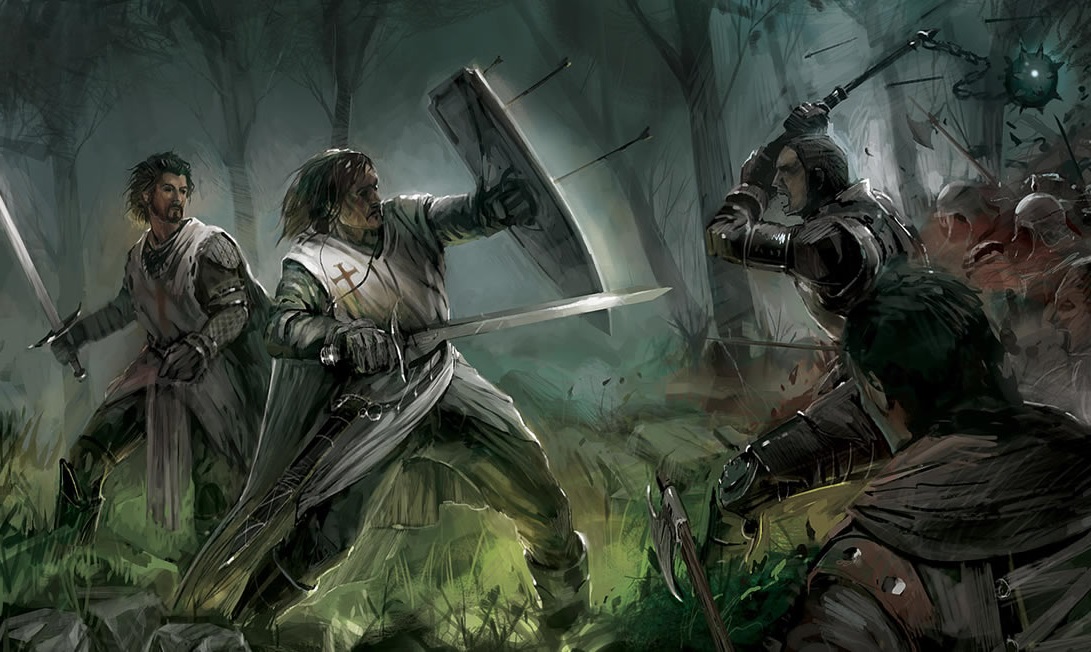The
Seen and the Unseen War
Stephen
Terry
Commentary
for the April 30, 2016 Sabbath School Lesson
 “Truly
I tell you, among those born of women there has not risen anyone greater than
John the Baptist; yet whoever is least in the kingdom of heaven is greater than
he. From the days of John the Baptist until now, the kingdom of heaven has been
subjected to violence, and violent people have been raiding it.” Matthew
11:11-12, NIV
“Truly
I tell you, among those born of women there has not risen anyone greater than
John the Baptist; yet whoever is least in the kingdom of heaven is greater than
he. From the days of John the Baptist until now, the kingdom of heaven has been
subjected to violence, and violent people have been raiding it.” Matthew
11:11-12, NIV
Almost from the very beginning, those who would choose
to stand for God have seemed to be fighting a hopeless battle against
overwhelming odds. The very first person born on the earth, Cain, violently
murdered the second person born, his brother, Abel, and so the struggle began.
It reached the point for the antediluvians where the entire world stood in
opposition to a measly eight individuals. How challenging this must have been
for Noah, his three sons and their wives. Perhaps the rest of the world
wondered at the temerity of so few willing to stand against so many. Surely God
must have miraculously protected them, for it would have been so easy for the
evil horde to snuff out the lives of those few faithful servants of God. Eventually
God intervened and the earth enjoyed a period of relative peace after the flood
when those few had the entire planet to themselves.
However, when their numbers increased, evil reared its
head again. Men began to build a tower to reach to heaven.[i] This tower provided a
focus for their evil intent, bringing together everyone for a singular effort.
Apparently knowing the potential for evil in such an effort, God confounded
their language so they could no longer easily work together. Thus began the
need for translators, diplomacy and the need to build trust in spite of
repeated misunderstandings rooted in language that bedevils us to this day.
While it stymied the focused efforts of evil, it also made it more difficult to
spread the message about the kingdom of God. How much easier it would have been
if there were only one language. But the antediluvians are proof that even with
one language, people will not necessarily listen. In situations where the
language was not a barrier, unrepentant individuals have shown that language is
less a factor than openness of heart.
Many centuries later, Moses was raised in the household
of Pharaoh and likely became not only proficient but perhaps even eloquent in
the language of the Egyptians. Yet, in spite of that eloquence, when he stood
before Pharaoh and requested the Israelites be allowed to leave to worship God,
the Egyptians refused. They wanted their Israelite slaves to remain and
continue to serve the unified purpose of Egypt, a purpose that did not include
the worship of God. Egypt had substituted the worship of idols for the worship
of God the Creator. These idols, being manmade were easy to suborn to the
purposes of Egypt. Not living they could not resist and would always conform to
the will of the ruler. A living God with an independent will could be a
problem. When that God began to display His power and finally brought
devastation to Egypt, Pharaoh’s will was temporarily broken and he allowed the
Israelites to leave. But his pride soon reasserted itself, and he pursued the
fleeing Israelites into the desert until they were trapped with their backs to
the water. Faced with an army with state-of-the-art equipment that may have
vastly outnumbered the fleeing slaves, the tendency might be to panic, fleeing
into the water or surrendering in the hope of finding mercy in the hard heart
of Pharaoh. But Moses seemed to understand the God who lovingly protects the
few against the many. He told the people with him they only needed to be still.[ii] As we know from the rest
of the story, God parted the waters and the people passed through. Pharaoh and
his army attempted to do the same. However, in a re-enactment of the flood in
miniature, the waters took the pursuers away.
Again and again God’s apparently weaker force triumphed
over evil. Often that force consisted of only one person. Elijah stood on Mount
Carmel[iii] on behalf of God, one
person against the entire kingdom of Israel, who had apostatized and gone over
to the worshipping of idols. Nonetheless, Elijah stood firm and God manifested
a miraculous fire. The people, won over by the miracle, slew the prophets of
Baal who had led them in their idolatry, and at least briefly acknowledged the
true God. Unfortunately, Elijah vacillated in his commitment to stand for God
and fled, fearing those who would take his life. Later he finds his courage
again and confronts wicked King Ahab over the murder of Naboth and the theft of
his vineyard.[iv]
His restored faith becomes so strong that later when King Ahaziah sends soldiers
for him, because of their disrespect, he calls down fire from heaven on them.[v]
Elisha, Elijah’s successor, became such a threat to
those who would do evil that eventually the King of Aram sent an army to
capture him in the city of Dothan.[vi] Seemingly powerless in
the face of such a threat, Elisha’s servant is fearful of the outcome, but his
eyes are opened in answer to Elisha’s prayer, and he sees the surrounding hills
covered with an army God has sent to deliver them. That army strikes the
Aramean army with blindness, and they are captured by Elisha, demonstrating
that God is well able to prevail on behalf of His children whether they are
many or few. This theme is repeated over and over again in the Bible. There is Daniel
who prevailed in the lions’ den.[vii] There were also Shadrach,
Meshach, and Abednego who stood for God on the plain of Dura against the entire
Babylonian nation and were delivered from the wrath of the king unharmed.[viii] They emerged from the
fiery furnace they had been cast into without even the smell of smoke upon
them. We cannot forget David who stood before the army of the Philistines and
slew their champion Goliath without sword or shield, using only a stone and a
sling to bring down the mighty giant.[ix]
Yet, to all these accounts, we have a counterpoint. In
spite of the stories where the Lord saves His people in spite of overwhelming
odds, we have the story of John the Baptist, the story alluded to in our text
at the top of the page.[x] John publicly accused
Herod of sin for taking his brother Philip’s wife for his own. The incensed
king cast John into prison where he was ultimately beheaded, his wife being the
instigator in that dastardly act. Jesus was aware that John was in prison for
He had entertained a pair of John’s disciples who came to question whether or
not Jesus was the Messiah. He told them to return to John and tell him of the
miracles they saw as Jesus healed the sick. They did so, but there is no record
of John’s response. Perhaps he questioned as some do today, why Jesus did not
save him from prison, especially considering his coming death at the hands of
Herod? But John’s case is not the only example. Why did God save Elijah from
the soldiers Azariah sent to arrest him but not save Isaiah from being sawn in
two by Manasseh?[xi]
Why did God spare the lives of Daniel and his three friends, but not save
Zechariah from those that murdered him?[xii] Maybe this is like
asking why could God save so many by various interventions and not be able to
save His Son Jesus from death. Perhaps the point is that all of these, like
Jesus, will rise again. Apparently, Moses and Elijah already have.[xiii] They appeared on the
Mount of Transfiguration to speak with Jesus. Again though that only adds
emphasis to the question. If Elijah could be taken to heaven without
experiencing death, why couldn’t the same happen for John who preached in the
spirit of Elijah?[xiv]
Was his death perhaps a prophecy of what was to come for Jesus?
Even more puzzling is Jesus statement that the least in
the Kingdom of Heaven is greater than John the Baptist. Is this statement meant
to exclude John from the kingdom? After all, if one is the least within, then
someone less than that must be out, right? But perhaps this is simply a bit of
word play. Jesus had said elsewhere that whoever was the least was the greatest.[xv] Is it possible that has
been the lesson of the warfare all along? That true victory comes not from
might and power, but from service and humility. When John and Paul submitted to
the swords that beheaded them, if they knew they would rise again, present loss
may have been irrelevant. What mattered was the service they had done to win
others to Jesus. When we read about the armor of God in Ephesians, chapter six,
we may be tempted to see ourselves like the Templar in the picture at the top
of the page, standing our ground and battling the foe, swinging the mighty
sword, the Word of God to and fro, thrusting it deep into the bodies of our
enemies. However, there is no indication we are to use the Word in this way.
Instead of thrusting it about, we might need to understand that the Word is by
its very nature more powerful than any sword.[xvi] Who has not read the
Bible and been made aware of their need and been touched deeply by the message
there? It is living and powerful in its own right. We may not need to add the
power of our own thrust. We may need only be still.
